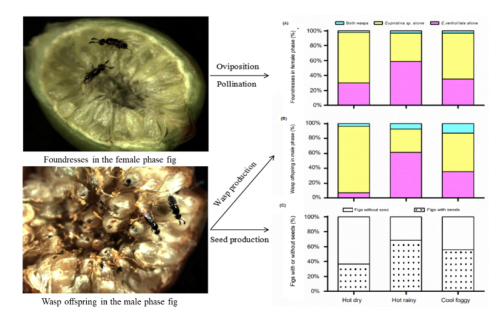Among the 800 fig (Ficus) species, it was originally considered that each was pollinated by their own wasp (Agaonidae). However, recent investigations show that this ‘one-to-one’ rule often breaks down, as fig species regularly host multiple agaonids but in ways suggesting that competitive processes still mediate biodiversity outcomes.
It is unknown how this cheater's seasonal occurrence patterns compare with the pollinator and their host fig's phenology.
To assess the reproductive output of F. microcarpa, researchers from Xishuangbanna Tropical Botanical Garden (XTBG) conducted a phenological survey of the fig–fig wasp pair, Ficus microcarpa and its associated pollinating wasp, alongside its sister species, the cheating wasp, in Xishuangbanna, China.
Pollinator and cheater abundances showed marked seasonal differences, with high abundance of one species coinciding with low abundance of the other, as observed in the two other pollinator–cheater pairs, F. altissima and F. sycomorus. Seed and pollinator production fell markedly during cooler, drier months, although high levels of fig production continued.
“Given the rarity of cheating in Agaonidae, it is notable that two recorded examples occur in Yunnan, suggesting that extreme local conditions may provide an opportunity for cheater evolution”, said Prof. PENG Yanqiong, principal investigator of the study.
The study entitled “Non‐pollinating cheater wasps benefit from seasonally poor performance of the mutualistic pollinating wasps at the northern limit of the range ofFicus microcarpa” has been published in Ecological Entomology.
Contact
PENG Yanqiong Ph.D Principal Investigator
Key Laboratory of Tropical Forest Ecology, Xishuangbanna Tropical Botanical Garden, Chinese Academy of Sciences, Mengla, Yunnan 666303, China
E-mail: pengyq@xtbg.ac.cn


